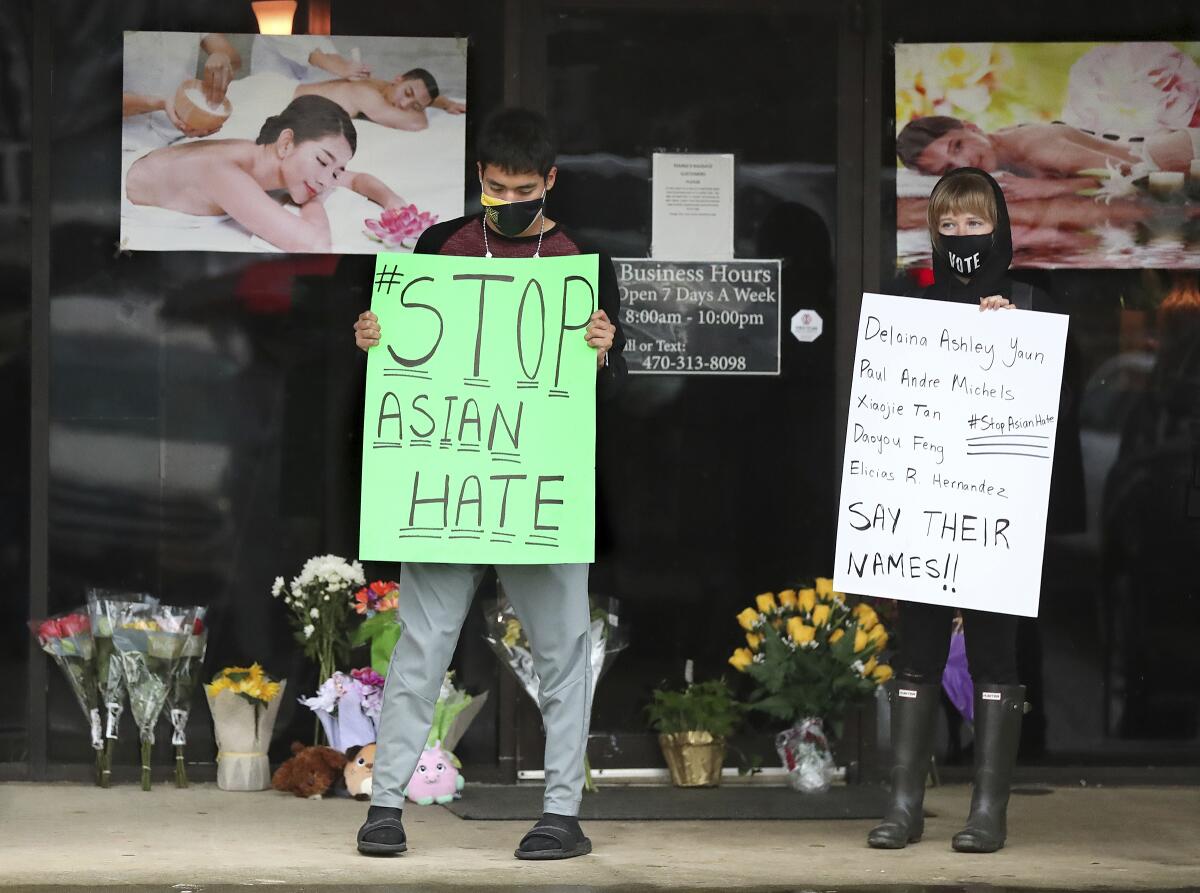Essential California: A torrent of hate

- Share via
Good morning, and welcome to the Essential California newsletter. It’s Thursday, March 18, and I’m writing from Los Angeles.
Sign up for Essential California
The most important California stories and recommendations in your inbox every morning.
You may occasionally receive promotional content from the Los Angeles Times.
Talk of pandemic anniversaries has been everywhere as the slow tide of the calendar washes back into March, forming a long litany of One Year Sinces. One year since the bottom fell out, one year since everything was canceled, one year since the first local shelter-in-place orders.
It has also been almost exactly a year since Russell Jeung, a professor of Asian American studies at San Francisco State, co-founded the group Stop AAPI Hate in response to the alarming rise in discrimination and racially motivated attacks perpetrated against Asian Americans and Pacific Islanders (AAPI) in the U.S.
Even before the coronavirus spread across the globe, the then-epidemic fueled a torrent of hate and xenophobia.
On Tuesday morning, Stop AAPI Hate released a report documenting how thousands of Asian Americans had faced racist verbal and physical attacks or had been shunned by others since coronavirus shutdowns began last March. As my colleague Anh Do reported, the study found that most of the incidents occurred at businesses or on public streets, and more than two-thirds of the attacks in the study were reported by women.
Anh tweeted that morning that for Asians, going out was no longer just about masking and social distancing. “You must be vigilant - alert to guarding yourself, your family, your peers,” she wrote.
[Read the story: “Asian Americans have been verbally and physically attacked, shunned during pandemic, study shows” in the Los Angeles Times]
On Tuesday evening, eight people, including six women of Asian descent, were shot to death at massage parlors in the Atlanta area. At least four of the women killed were of Korean descent.
The Atlanta killings come in the wake of a series of violent attacks against Asian American senior citizens in the Bay Area and New York City, and research that shows anti-Asian hate crimes have surged across the country.
Authorities said Wednesday that the 21-year-old white suspect accused of visiting a string of businesses with Asian workers and murdering predominantly women of Asian descent “did not appear to be” motivated by race. But, as my colleagues report, “many Asian Americans saw it differently. The mowing down of so many Asian women, at businesses known to employ Asian workers, was a racial targeting by its very circumstances, they said.”
[Read the story: “Violence has Asian Americans questioning how far they have really come in their American journey” in the Los Angeles Times]
Rep. Judy Chu (D-Monterey Park), the first Chinese American woman elected to Congress, laid the eight deaths directly at former President Trump’s feet, saying that “President Trump clearly stoked the flames of xenophobia against AAPIs with his rhetoric” about the coronavirus.
Anti-Asian incidents and attacks exploded during the pandemic, but the racist sentiment fueling the attacks is sadly far from new. As Qian Julie Wang wrote in a New York Times op-ed last month, anti-Asian sentiment “is woven into the very fabric of this country,” from the Page Act of 1875 that effectively barred Chinese women from entering the U.S. to the Chinese Exclusion Act of 1882.
That ugly historical legacy has deep roots in California, where the same 19th century Chinese immigrants who helped build the state’s early infrastructure were subject to racist laws and violent attacks.
In People vs. Hall, an 1854 California Supreme Court case that one legal scholar characterized as “containing some of the most offensive racial rhetoric to be found in the annals of California appellate jurisprudence,” the state’s high court ruled that testimony from Chinese witnesses was inadmissible when a white person was on trial. In essence, the decision “made it impossible to prosecute violence against Chinese immigrants.” The law remained on the books in 1871, when 18 Chinese immigrants were killed by a brutal Los Angeles mob.
[See also: “Anti-racism resources to support the Asian American and Pacific Islander community” from NBC News]
From the white mob that rampaged through the Filipino farmworker community in Watsonville, Calif., in the early days of the Great Depression to the more than 120,000 people of Japanese descent incarcerated during World War II, anti-Asian brutality has often been tied to periods of national peril and fear.
Elizabeth Choi, a 51-year-old Korean American homemaker in Brea, told my colleagues that her daughter had advised her not to go to “too many areas outside of Asian areas.”
“When they’re looking for a Chinese face” to blame the pandemic on, “any Asian face” will do, Choi’s daughter told her.
And now, here’s what’s happening across California:
A wave of reopenings has recently washed over California. Could more be around the corner? In Los Angeles County, which only days ago moved into the red tier for the first time since the state unveiled its four-category color-coded coronavirus reopening blueprint, officials are already eyeing the possibility of further advancement. Los Angeles Times
The Internal Revenue Service is delaying the April 15 tax filing deadline until May 17. The move provides more breathing room for taxpayers and the IRS alike to cope with changes brought on by the pandemic. Associated Press
Note: Some of the sites we link to may limit the number of stories you can access without subscribing.
L.A. STORIES
How the quest to build a helipad next to Sheriff Alex Villanueva’s home turned ugly: The Times obtained internal Sheriff’s Department documents under the state’s public records law to better understand what happened. Los Angeles Times
An interactive trip down Pico Boulevard shows how the business landscape has been changed by the pandemic. Los Angeles Times

“Are the beret wearers of Silver Lake and Echo Park here for revolution or croissants?” A fashion investigation from Image, The Times’ new style magazine. Los Angeles Times
A number of churches, particularly Black congregations, are stepping up to build affordable housing on their church land. And they’re banding together to send a clear message to developers: They will not be taken advantage of. Religion News Service
Support our journalism
POLITICS AND GOVERNMENT
The “race” to be California’s next attorney general: If Xavier Becerra is confirmed as expected this week as the U.S. Health and Human Services secretary, Gov. Gavin Newsom will appoint a replacement — filling a high-profile statewide role often seen as a springboard to higher aspirations. A few angles to consider this morning:
- AAPI elected officials urged Newsom on Wednesday to appoint an attorney general of Asian descent, saying it’s critical to have a top law enforcement official who understands and will combat anti-Asian violence. Associated Press
- Allies of Rep. Adam Schiff have been “heavily lobbying” Newsom to appoint Schiff to the role. Wall Street Journal
- Sacramento Mayor Darrell Steinberg is rumored to be among the top candidates. Steinberg was widely reported as a leading candidates for the same post five years ago when then-Atty. Gen. Kamala Harris was elected to the U.S. Senate. Sacramento Bee
- Newsom is expected to value death penalty opposition: Two years after Newsom ordered a moratorium on executions in California, his field of potential AG candidates includes some of the state’s leading critics of the death penalty, as my colleagues reported last month. Los Angeles Times
Dianne Feinstein says she’s staying in Senate regardless of husband’s plans. The senator confirmed Wednesday that her husband is interested in an ambassadorship from President Biden, but said she wasn’t going anywhere. San Francisco Chronicle
As recall effort hits milestone, Democrats scramble for a united front to keep Newsom in office: Democratic leaders across California are throwing their support behind the governor, who acknowledged a recall effort is likely to qualify as Wednesday’s signature-gathering deadline passed. Los Angeles Times
“I want them to be able to say that this is the same shot that the mayor got.” San Francisco Mayor London Breed received the one-shot Johnson & Johnson vaccine in front of TV cameras, as she urged constituents who might be hesitant to get vaccinated. San Francisco Chronicle
HEALTH AND THE ENVIRONMENT
Fresno health inspectors tipped off Foster Farms about state COVID-19 inspection: Dozens “of emails obtained by The Fresno Bee through a Public Records Act request show that during the outbreak at the South Cherry Avenue plant that infected hundreds, health officials tipped off company executives about a Cal/OSHA inspection, coordinated media talking points during the crisis, withheld information from the public and issued no corrective actions.” Fresno Bee
CALIFORNIA CULTURE
Disneyland to reopen April 30: More than a year after closing due to the pandemic, the theme parks at the Disneyland Resort in Anaheim are scheduled to reopen at the end of next month with limited capacity and restrictions on some attractions. Los Angeles Times
A poem to start your Thursday: “The Man Moves Earth” by Cathy Song. Poetry Foundation
Free online games
Get our free daily crossword puzzle, sudoku, word search and arcade games in our new game center at latimes.com/games.
CALIFORNIA ALMANAC
Los Angeles: partly cloudy, 68. San Diego: partly cloudy, 64. San Francisco: rain will fall from the sky, 57. San Jose: more rain, 61. Fresno: partly sunny, 72. Sacramento: rain, 57.
AND FINALLY
Today’s California memory comes from Lawrence Lee:
In the late 1960s when I was about 18, I took my girlfriend to the original Lawry’s on La Cienega. At the time, Nehru jackets were the rage, as well as white turtlenecks with a medallion. Our male friend joined us and we both wore turtlenecks with some type of large medallion. Little did we know that men were required to wear a coat to dine. Lawry’s offered us very ill-fitting sport coats that were either too tight or too long. It was a memorable dinner in the most uncomfortable coat covering our fashionable turtlenecks and medallions.
If you have a memory or story about the Golden State, share it with us. (Please keep your story to 100 words.)
Please let us know what we can do to make this newsletter more useful to you. Send comments, complaints, ideas and unrelated book recommendations to Julia Wick. Follow her on Twitter @Sherlyholmes.
Sign up for Essential California
The most important California stories and recommendations in your inbox every morning.
You may occasionally receive promotional content from the Los Angeles Times.


![Vista, California-Apri 2, 2025-Hours after undergoing dental surgery a 9-year-old girl was found unresponsive in her home, officials are investigating what caused her death. On March 18, Silvanna Moreno was placed under anesthesia for a dental surgery at Dreamtime Dentistry, a dental facility that "strive[s] to be the premier office for sedation dentistry in Vitsa, CA. (Google Maps)](https://ca-times.brightspotcdn.com/dims4/default/07a58b2/2147483647/strip/true/crop/2016x1344+29+0/resize/840x560!/quality/75/?url=https%3A%2F%2Fcalifornia-times-brightspot.s3.amazonaws.com%2F78%2Ffd%2F9bbf9b62489fa209f9c67df2e472%2Fla-me-dreamtime-dentist-01.jpg)




